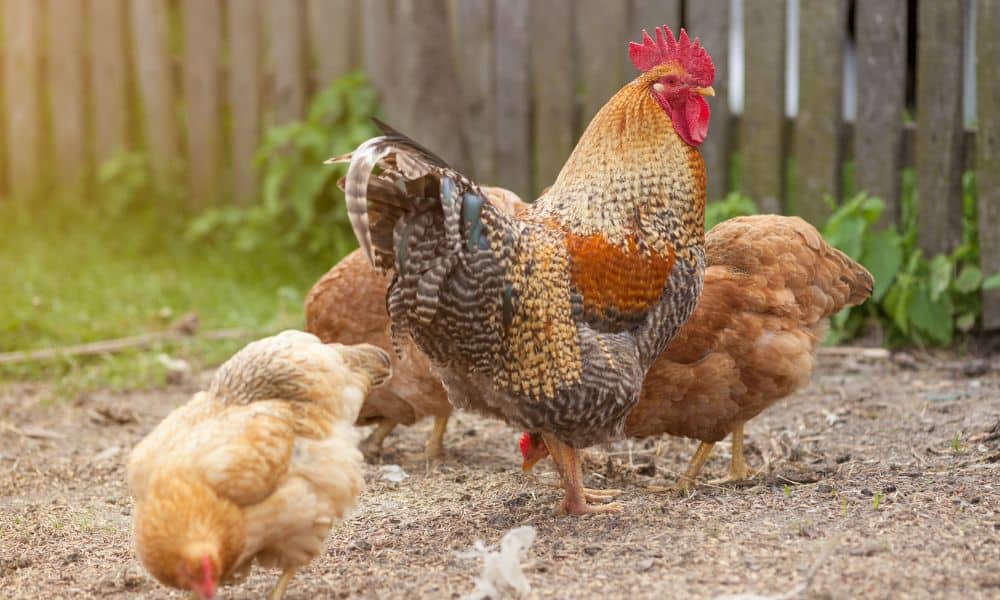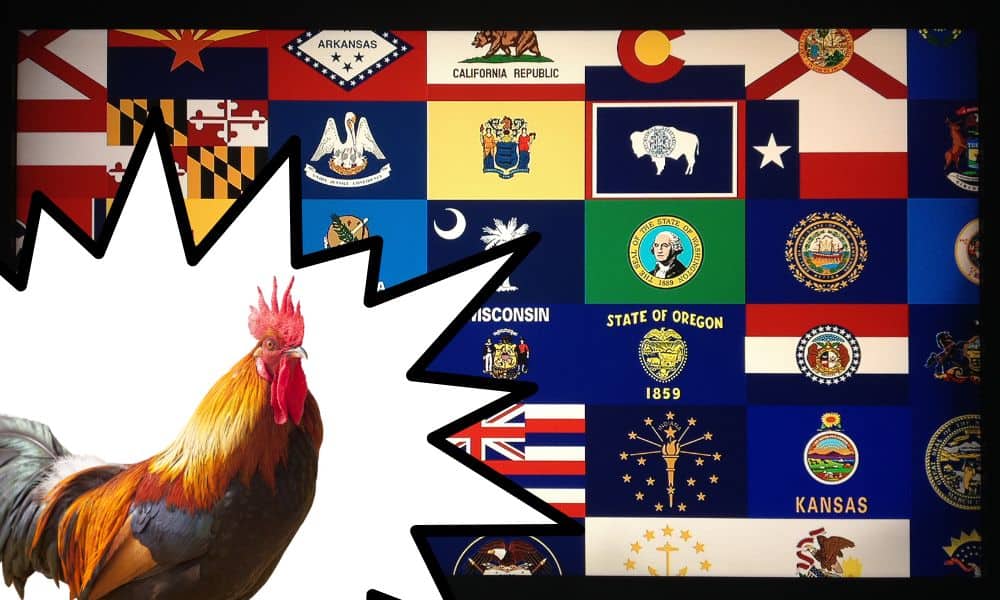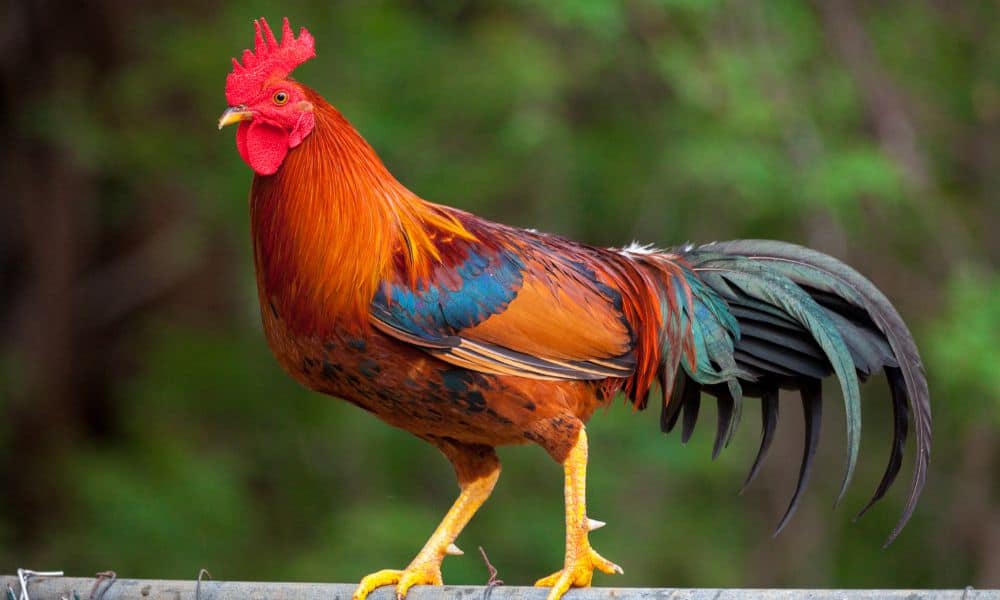Maybe you’ve found out that one of your beloved baby chicks is actually a rooster, and now you’re wondering if it’s legal to keep it even though you live in a residential area.
Maybe you simply want to add a stunning rooster to your backyard flock.
As we know, many residential areas in the world allow the housing of hens, but many don’t allow the housing of roosters. So how can you tell if it’s legal in your area?
Here we go through how to find out if it’s legal to own a rooster in your area, no matter what state of the U.S you are in, or even what part of the world you are in!
Contents
Should You Raise A Rooster In A Residential Area?
Before looking at specific laws permitting or banning roosters in residential areas, it’s best to start with some common sense first.
Although there are certainly advantages to owning a rooster, such as egg fertilization, flock protection, or brilliant companionship, owning a rooster has its potential downsides too.
Roosters crow, almost religiously. A rooster will normally crow every morning and even throughout the day. They need space and will grow a bit larger than hens too.
If you live in a city or suburban area where you can see the neighboring houses around you from your backyard, common sense will tell you it’s probably not the best idea to raise a rooster in your environment. Even before you consider the legality of it!
However, if you live in a rural or semi-rural place with an acre or two of land between you and the neighboring properties, then it’s much more reasonable to be raising a rooster.
Is It Legal To Have A Rooster In A Residential Area?

Even if you’re on a large block of land and have heaps of space for chickens, you still might not legally be able to have a rooster.
Whether it’s legal to raise a rooster in a residential area depends on where you live, which zone you’re in, and what covenants apply to your neighborhood.
For example, many city ordinances don’t allow having agricultural animals in residential areas, and yes, this includes roosters.
On the other hand, some zones will allow you to keep chickens but not roosters because they violate noise ordinances with their crowing.
Even if you are in the right zone and suburb, you could still face some limitations.
For one, the restrictions might apply to the number of birds you can keep or the separating distance from your closest neighbors.
And of course, even if it’s legal to own roosters in your area, you’ll still have to comply with the noise ordinances. You may need to apply for a permit and there may be fees involved too!
So with all these different laws, covenants, and restrictions that apply depending on where you live, how can you find out with any certainty whether it’s legal for you to own a rooster?
How To Find Out if It’s Legal To Own A Rooster In Your Area?

Once you’ve considered that your environment is appropriate for raising roosters and you’re wanting to raise one, it’s hard to know where to turn to get answers to whether it’s legal or not in your area.
After all, many U.S states and other places in the world have their own laws and governance about backyard farming and raising roosters.
Here are the steps you can go through to find out whether it’s legal or not to have a rooster in your area. This approach can be adopted no matter which U.S state you live in, or even what part of the world you are in.
Step 1: Check Your State Ordinances
Most countries and states have a website containing the regulations and ordinances for residential living.
If you live in the U.S, one quick and reliable way to find information regarding your state’s ordinances is to use the Municode library.
You can select your state and area and it populates the current Code Of Ordinances for your area.
From here, review the chapters regarding animals, nuisances, and agriculture.
If you can’t find your country’s or state’s ordinances, try calling or visiting your local zoning office for more information.
Step 2: Take A Look At Your Property’s Covenants
Most communities, suburbs, or residential areas have a specific declaration that holds information about the standards and restrictions of properties in that area.
This is sometimes referred to as your property’s covenants, but legally it’s referred to as the Declaration of Covenants, Conditions, and Restrictions (CC&Rs).
These covenants control what you can and can’t do on your property, from paint colors to fence heights, to pets and animals you can and can’t raise.
Once you’ve checked your ordinances, take a look at your property’s CC&Rs to see if there are any local restrictions on raising roosters.
Step 3: Enquire With Your Local Council/Real Estate Lawyer
If you can’t find out with any certainty from your state ordinances and CC&Rs whether it’s legal to raise a rooster in your area, then you can also go one step further and contact:
- Your Local Council: you can write a letter or email to your local council seeking clarification on whether you’re property and area is allowed to house roosters. They will hold all the information on the legality, and whether any permits are required.
- Your Local Real Estate Lawyer: It’s likely that your local real estate lawyer will be well-equipped with the knowledge and know-how to track down whether it’s legal for you to own a rooster. Just enquire about the price before making any formal commitments with them!
Why It’s Illegal To Own A Rooster In Some Residential Areas

If you’ve found out that it’s illegal to house roosters in your area, I can understand you may be frustrated. Especially if you’ve been raising chicks and have found out one or more is actually a rooster instead of a hen!
It’s normal to be upset and want answers.
Here are the most probable reasons why it’s illegal to own a rooster in some residential areas:
- Noise: Roosters crow, whether we like it or not. Although this has its advantages for farms and larger flocks, it can be extremely annoying for neighbors within hearing distance. The frequent complaints in residential areas have probably led to these anti-rooster laws!
- Farming & Agriculture Standards: Being male chickens, roosters fertilize their hen’s eggs. Fertilized eggs can lead to baby chicks. Having the means to create baby chicks in residential areas encourages owners to breed their chickens, which can lead to all sorts of ethical and agricultural debacles.
Best Of Luck!
I’ve seen it happen all too often.
Backyard farmers order young baby chicks which are supposed to be all hens, only to find out one or more are actually roosters.
It’s in these situations where it’s handy to know where you can look to find out whether it’s legal to own a rooster in your area.
Start with your country’s and state’s ordinances, followed by looking at your property’s covenants. If you’re really stuck, have a chat with your local council or local real estate lawyer to ascertain whether it’s legal or not to raise a rooster in your area.
The good news is it’s much more likely to be legal to raise hens in residential areas. So in many areas, you can still raise a productive and happy backyard farm — even if you can’t have a rooster!
